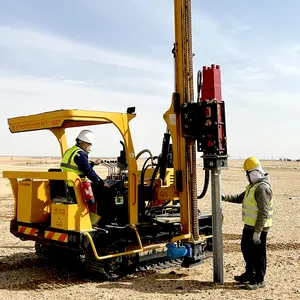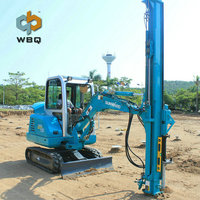

Factory Sale Multifunctional Photovoltaic Ramming Machine Solar Pile Driver Ground Screw Pile With GPS








In an era where efficiency and sustainability are paramount, advanced ground screw machine technology is revolutionizing the construction industry. This innovative approach offers a robust alternative to traditional foundation methods, streamlining project timelines and minimizing environmental impact. Ground screw machines, with their diverse applications and adaptability, are transforming how foundations are installed across various soil conditions. From solar arrays to residential decks, these machines deliver immediate load-bearing capabilities, essential for projects with stringent deadlines. As we delve into the intricacies of ground screw technology, we uncover the versatility, efficiency, and environmental benefits that these machines bring to modern construction projects.

Ground screw machines facilitate the installation of ground screws, which are utilized across various soil conditions. These machines operate with low speed and high torque drivers, ensuring efficient and reliable insertion of ground screws into the earth. The immediate load-bearing capability of ground screws post-installation is a significant advantage, particularly for projects with tight deadlines such as solar array setups, deck constructions, and the establishment of fences and foundational structures.
The versatility of ground screw machines is evident in the range of drivers that can be employed, from hand-held electric drivers for smaller-scale projects to machine-mounted hydraulic drivers for larger, more demanding installations. For domestic applications, manual drivers are also available, catering to household-sized screws. This adaptability makes ground screw machines an essential tool in modern construction and installation projects.
Ground screw machines, a pivotal component in modern construction, come in various types to suit different project needs. Among the diverse options available on Alibaba.com, hydraulic pile drivers stand out for their efficiency in driving sheet piles and tubes into the ground. These machines are adaptable to various pile sizes, ensuring optimal performance. Another type is the vibratory hammer, which employs vertical vibrations to effectively drive piles into the soil and can also facilitate vertical soil drainage. For projects requiring precise drilling, the rotary drilling rig is an ideal choice, with its sharp rotating bits designed for creating larger diameter holes at greater depths.
Specialized machines like the dock pile driver are engineered for marine construction, driving steel pilings into lakebeds for stable dock foundations. These are particularly effective in lakes with minimal ice impact. When selecting a ground screw machine, it's crucial to consider the machine's capacity to handle the loads and the soil conditions of the construction site. Alibaba.com features a range of ground screw machines that cater to these diverse requirements, ensuring that contractors can find the right equipment for their specific construction needs.
Ground screw machines offer versatile foundation solutions across various industries. The G-series ground screws are utilized for the swift and secure installation of masts and fence posts, making them suitable for telecommunications and agricultural applications. The M-series, with a centered M-thread, directly connects to the object being supported, ideal for prefabricated structures like garages and containers, often used in the construction and logistics sectors. For projects involving timber, such as carports and wooden terraces, the U-series ground screws are specifically designed to accommodate standard timber beams, ensuring a stable and straightforward mounting process. In high-load projects, extendable V-series ground screws can be adapted to meet specific project requirements, demonstrating their utility in large-scale construction and civil engineering works. These ground screws are a sustainable alternative for both surface and deep foundations, providing a reliable base for a multitude of structural forms, from small-scale installations to extensive construction projects.

Ground screw machines are specialized equipment designed for the installation of ground screws, which serve as a sustainable alternative to traditional concrete foundations. These machines come in various types and designs, tailored to meet the demands of different construction environments. Entry-level manual drivers, for instance, allow for the installation of small-scale foundations by hand, accommodating ground screws up to 140 mm in diameter and 1600 mm in pipe length, with torque capabilities up to 3,500 Nm.
For larger projects, add-ons for existing machinery like caterpillars can be utilized, enhancing machine utilization with hydraulic capabilities. These add-ons, such as free pendulums or drill attachments, can handle significantly higher torques, up to 20,000 Nm, making them suitable for hard or rocky grounds and inclined surfaces. The precision of these attachments ensures perpendicular installation with controlled feed force, which is crucial for maintaining low installation tolerances.
Self-driving ground screw drivers, exemplified by models like the KRD 30, combine the precision of drilling attachments with enhanced maneuverability. These machines are lightweight, often weighing around one ton, allowing for easy transportation and access to constrained sites without substantial ground disturbance. With torque capacities like 8,000 Nm and the ability to navigate gradients, these self-driving units represent the advanced capabilities of modern ground screw installation technology.
Ground screw machines utilize components made predominantly from Q235B steel, known for its balance of strength and malleability. This material is essential for ensuring the durability and longevity of the screws when anchored into the ground. The steel undergoes a continuous welded helix process, which contributes to the structural integrity of the ground screws. A critical aspect of the material is its coating; the screws are hot-dipped galvanized according to ASTM123 standards, with an average minimum thickness of 75 microns (0.0762 mm). This galvanization process is crucial as it provides a protective layer against corrosion, which is particularly important for outdoor construction projects where the screws are exposed to various weather conditions.
The wall thickness of these ground screws varies, with options ranging from 2mm to 3.75mm, allowing for customization based on the structural requirements of different projects. The thread lengths also vary, offering a range from 610mm to 880mm, which accommodates various soil types and installation depths. These material specifications are designed to meet rigorous quality control tolerances, ensuring that each ground screw machine produces components that are consistent in quality and performance. The diameters of the screws are another consideration, with a range available from 50mm to 114mm, providing versatility for different project scales and structural needs.

Ground screws, as an alternative to concrete foundations, bring several benefits to construction projects. They eliminate the need for soil sealing, preserving the soil ecosystem and allowing natural water drainage, which is crucial for maintaining the site's original condition post-construction. The installation process of ground screws is notably less invasive than that of concrete, as it does not require extensive excavation, thus minimizing environmental disruption and avoiding the generation of waste material.
These machines are adept at handling various terrains, including sloped areas where traditional heavy machinery cannot operate. The installation is swift, often completed within a couple of days, and is not weather-dependent, allowing for immediate load-bearing and adherence to tight project schedules. Furthermore, ground screws are easily removable and recyclable, which contributes to the sustainability of the project by allowing the site to return to its natural state after deconstruction.
Selecting the appropriate ground screw driver is crucial for the successful installation of screw foundations. A variety of machines are available, each with specific advantages tailored to different project requirements. For precision tasks, drill-guided machines are recommended due to their accuracy. On the other hand, for more confined spaces, a manual ground screw driver may suffice. The choice of machine impacts the efficiency and effectiveness of the installation process, influencing the overall project outcome. It's essential to consider the machine's compatibility with the project's scale and the nature of the site to ensure optimal performance and the integrity of the screw foundations.
Ground screw machines represent a significant leap forward in construction technology, offering a blend of versatility, efficiency, and sustainability. With the ability to navigate diverse terrains and soil conditions, these machines facilitate the rapid installation of ground screws, providing immediate structural support and adhering to tight project schedules. The adaptability of ground screw machines to different project scales and the minimal environmental disruption they cause underscore their importance in contemporary construction. By selecting the right machine for the task, project potential is maximized, ensuring that each foundation is installed with precision and integrity. As the construction industry continues to evolve, the integration of ground screw technology is set to play a pivotal role in shaping the future of construction, making it leaner, greener, and more efficient.